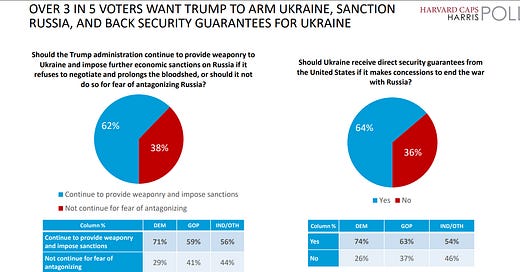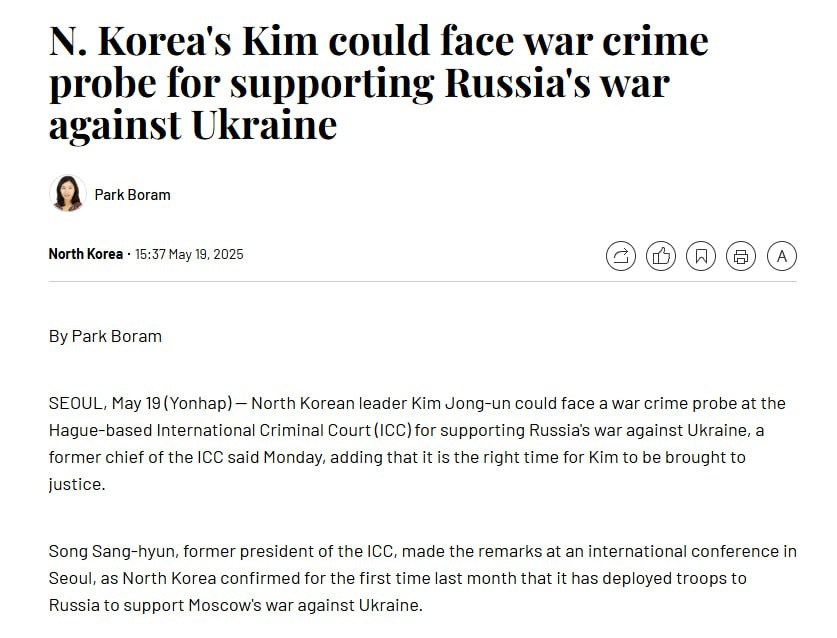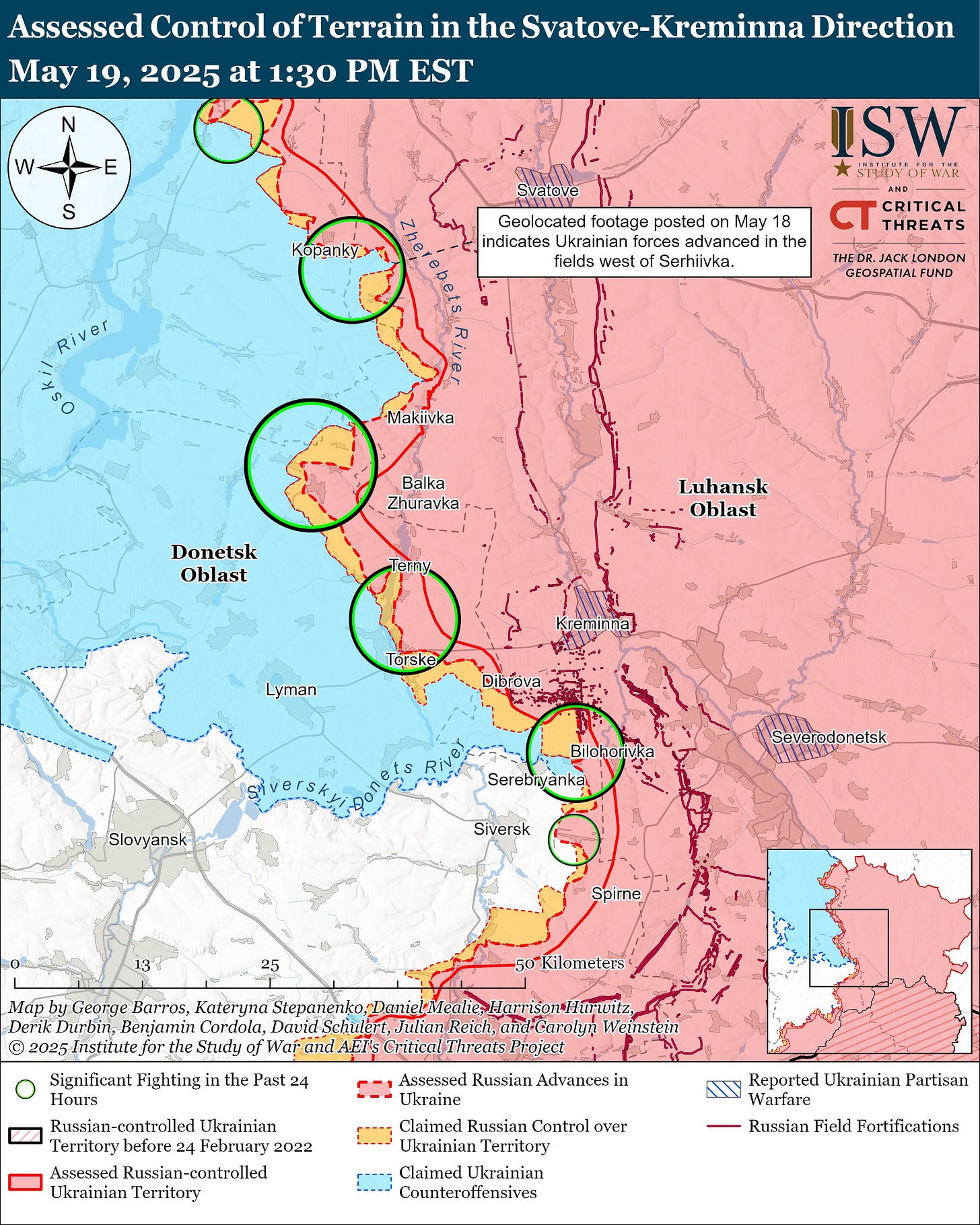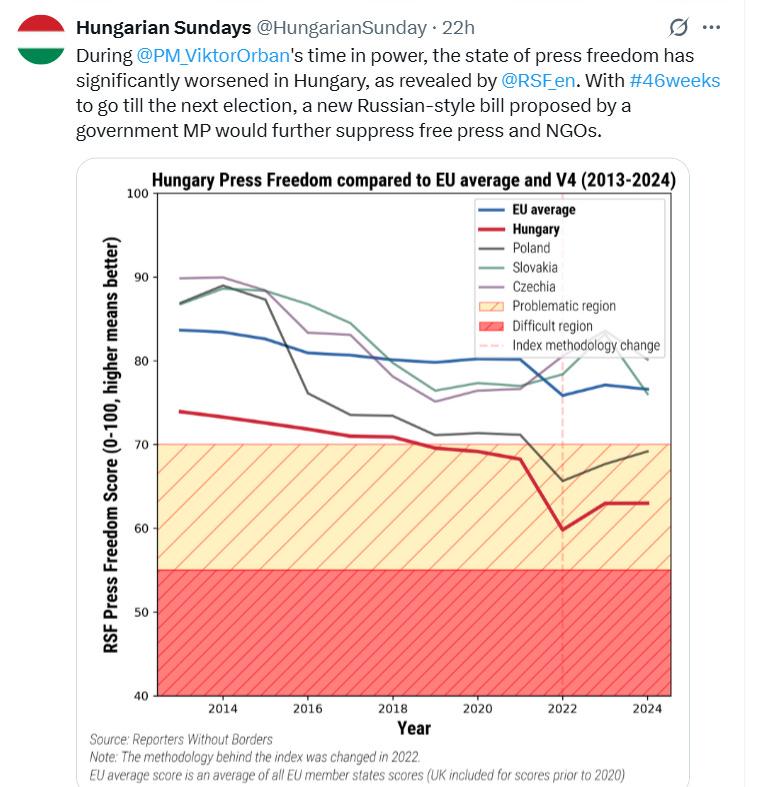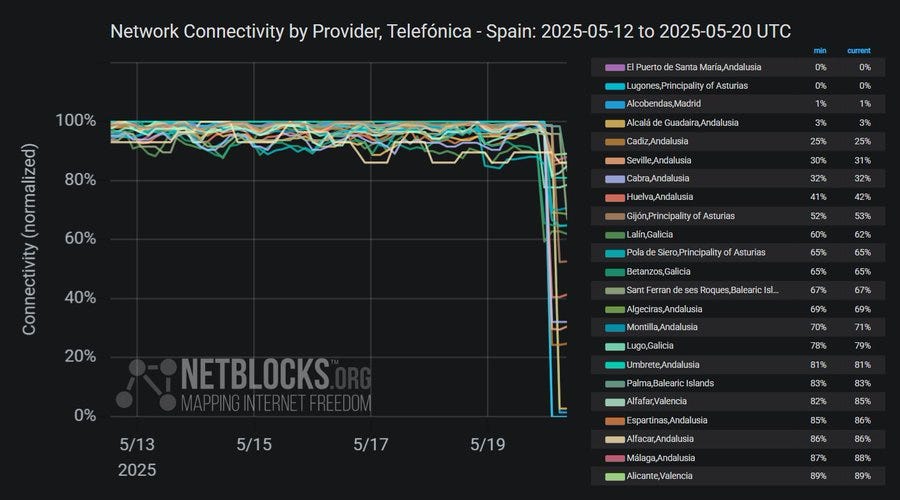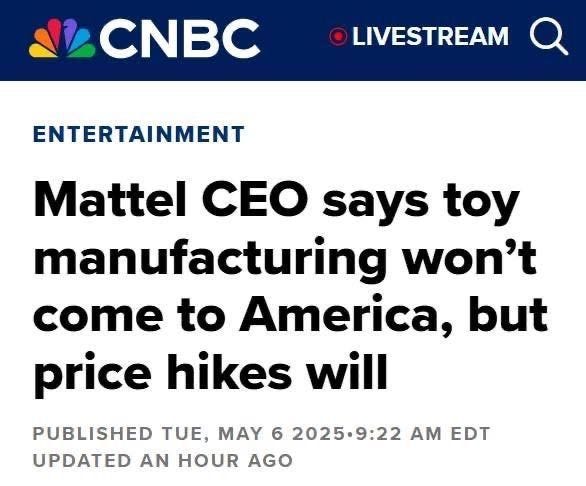Catching up…
For specific news about Trump, his regime and its dealings with Russia, I direct you to Olga’s substack. She and Julie Roginsky publish a weekly podcast, “Pax Americana”, which is highly informative.
For a general view of news from various geopolitical threatres, Scott’s EA Worldview is always superb.
Let’s get going…
Stories we’re following…
Ukrainian air defense—including aircraft, air defense units, EW systems, and mobile fire teams—intercepted 93 drones (35 shot down, 58 jammed) out of 108 launched.
Russia’s Drone Barrage Against Ukraine – Monday’s phone diplomacy followed a brutal 24 hours in Ukraine. Many Ukrainians were digging out early Monday after Russia’s record-setting drone attack; the Ukrainian air force said that in the previous 24 hours, Russia had launched “273 Shahed attack drones and various types of imitator drones,” of which 88 were destroyed and 128 more went astray “without negative consequences.”
The Guardian and Reuters reported that Ukraine’s intelligence service believed Moscow had intended to fire an intercontinental ballistic missile as well. Kyiv regional Gov. Mykola Kalashnyk said a 28-year-old woman was killed in a drone attack and three other people, including a 4-year-old child, were wounded, the Associated Press reported.
Nearly 56,000 residents evacuated from Sumy Oblast, additional efforts ongoing, governor says. Currently, over 86,000 residents are subject to mandatory evacuation orders in the region, with approximately 65% of the population having already evacuated, Sumy Oblast Governor Oleh Hryhorov told Suspilne Sumy.
How Russia is stripping Ukrainians of property in Crimea: In occupied Crimea, corrupt notaries are helping transfer ownership of Ukrainians’ apartments to Russian military personnel. It’s just one of several schemes the Kremlin-installed authorities are using to strip Ukrainians of their property, especially those who refused to take Russian citizenship. RFE/RL’s Crimean service, Krym.Realii, looked into how Russia has systematized the seizure of Ukrainian-owned homes across the occupied peninsula.
Christian Amanpour interviewed Ukraine’s former Minister of Foreign Affairs, Dmytro Kuleba: “Putin still believes he can subjugate the whole of Ukraine. I can assure you”
Combat Situation
ISW: Ukrainian forces recently advanced in Kursk Oblast and near Borova and Toretsk. Russian forces recently advanced in Kursk Oblast and near Chasiv Yar, Toretsk, and Novopavlivka.
Degrading capabilities: On May 16, a strike hit Russian mil. unit 12676 (126th Coastal Defense Brigade). A building storing ammo was destroyed. Nearby container storage suggests it may have held foreign-supplied munitions. Given its proximity to the Angarsky and 126th brigade ranges, it likely housed Iranian or North Korean ammo.
For the first time, a Shahed drone was shot down by a Ukrainian drone mid-air. Using a Sting interceptor equipped with thermal vision, Ukraine’s "Wild Hornets" unit hunted the Shahed above the clouds and struck it from below.
Behind the Lines
Belgium is ready to deploy troops to Ukraine immediately after a ceasefire is reached, says Defense Minister Theo Francken.
"We are prepared to join the 'coalition of the willing' led by the UK and France and begin a mission in Ukraine right after the fighting stops."
Italy will provide Ukraine with another SAMP/T air and missile defense system as part of its 11th military aid package — this comes on top of the recently reported 400 M113 APCs. Defense Minister Guido Crosetto emphasized Italy's continuous commitment to Kyiv's security.
Denmark announced a new military aid package for Ukraine, worth €546 million, which will include artillery systems, ammunition and material support for aviation. Mads Mikkelsen explains why the Danes are considered the happiest nation in the world.
After call with Trump, Putin still refuses full ceasefire, again cites Russia's 'root causes' of war in Ukraine. The Russian president made no mention of an immediate and unconditional ceasefire — the key demand pushed by U.S. President Donald Trump and accepted by Ukraine back in March.
Zelensky dismisses Putin's demand to withdraw troops from 4 Ukrainian regions. "It means that they (Russia) don't want peace," President Volodymyr Zelensky said. "If they demand what they know we won't agree to," he added.
Zelensky shared details of his recent conversation with Trump, emphasizing that he asked Trump not to make any decisions about Ukraine without Ukraine’s direct involvement. He made it clear that Ukraine will not withdraw its forces from its own territory and will not yield to any ultimatums from Russia.
Trump threatens to 'back away' from Ukraine-Russia peace talks if progress is not made. "I tell you, big egos involved, but I think something's going to happen. And if it doesn't, I just back away, and they're going to have to keep going," U.S. President Donald Trump said. Trump says he will not impose new sanctions on Russia. “Because I think there’s a chance of getting something done, and if you do that, you could also make it much worse," Trump told reporters from the Oval Office on May 19.
Meduza: “Vladimir, you can pick up the phone anytime, and I’ll be happy to answer and happy to talk to you,” Donald Trump reportedly told Vladimir Putin in a phone call on Monday, May 19, according to Russian presidential aide Yuri Ushakov.
According to Ushakov, Trump said he views Russia as one of America’s most important partners, once the Ukrainian conflict is “resolved to some degree.” He added that the Russian and U.S. presidents plan to organize an in-person meeting, but it must be “well and thoroughly prepared.” No date or location for the meeting has been announced yet.
Harvard Caps Harris Poll: Over 60% of Americans believe Putin is "stalling" peace talks involving the United States, and back weaponry shipments to Ukraine and additional sanctions if Russia refuses to negotiate a peace deal, according to a Harvard CAPS Harris poll released on May 19.
The Cipher Brief—At the end of the day, this much was clear: there was no ceasefire, no breakthrough, and Ukraine’s leader was inisting – as he has every time Trump and Putin speak – that the Ukrainians not be sidelined.
MESSAGE TO THE WHITE HOUSE: PUTIN’S NOT AS STRONG AS YOU THINK – Cipher Brief expert and former chief of the CIA’s Central Eurasia Division Rob Dannenberg wrote – in a piece published before the Trump-Putin call Monday – that “the message to Ukrainians about what comes next should be clear; never give in, especially when the aggressor is not operating from a state of strength.” He said that Putin’s no-show at talks held in Istanbul Friday should be taken as a sign of weakness. “Putin proposed these negotiations almost certainly as a tactic to grab a propaganda edge by showing the U.S., Europe, China, and India that he is willing to negotiate (a keen observer will have noted however, that Putin has not made a single concession, not one, on his demands for the end of the war).” More of Dannenberg’s piece here.
Russians ramping up efforts all across Europe, with seemingly unlimited funds, to place their proxies in other governments. Norway's Kremlin-backed party "FOR" is now blanketing cities and online media sphere with "Stop funding the war in Ukraine for peace". This narrative has been one of the most stable in most EU countries: it amounts to the unilateral disarmament of Ukraine, and a degrading of EU member state defence capabilities, which is one of the Kremlin’s key strategic objectives.
Gabriellus Landbergis: The Future of the Council of the Baltic Sea States
The CBSS was originally founded after the Cold War to help newly independent countries like Lithuania and Poland integrate into the EU, and to bring Russia closer to the standards of Western-style multilateral diplomacy.
Thirty-three years later, most member states are in the EU, all are in NATO, and Russia is out. And one small detail—even if you leave Germany out of the calculations, the CBSS now unites one of the most prosperous regions in the world.
Today, the main item on every country’s agenda is security—specifically, the threat from Russia. If you were to draw a hybrid threat intensity map, the Baltic region would be entirely red. And unfortunately, neither NATO nor the EU has been able to respond effectively to these types of threats. In fact, the prevailing assumption is that countries should handle hybrid attacks on their own.
But the ability to respond to such threats varies significantly between, say, Poland or Germany and a country like Estonia. That’s why our proposal is to treat hybrid threats that fall below NATO’s Article 4 or 5 thresholds within a regional format. If such a grouping cannot manage them, the issue should then be escalated to NATO or the EU.
Our working title for this revamped CBSS is: Regional (Hybrid) Security Organization.
Additionally, the entire Western alliance is in flux. We know Europe can no longer take for granted that the US will remain its primary security guarantor. What this means in concrete terms is still unclear—will troops withdraw, will NATO’s role change? Everything is on the table. But if the transatlantic system fractures further, the region most affected by Russian aggression must be prepared to work even more closely together, and the CBSS could be the platform for exactly that.
Lennart Meri Conference May 17-18: former president of Estonia, Toomas Hendrik Ilves, calling out the lack of action of NATO member states.
Meanwhile in Russia & China…
Government services in RuNet have collapsed for the third time in a month. A large-scale failure of government services has occurred in Russia. According to Downdetector , the websites of the Federal Tax Service (FTS), the product labeling platform "Honest Sign", and the system for signing legal documents "Gosklyuch" were unavailable. This is the third serious incident of this kind in the Russian segment of the Internet since the beginning of the month.
Russia detains 8 teenagers accused of plotting attacks on police during Victory Day. Russian authorities have detained nine residents of Stavropol Krai, accusing them of plotting an attack on security forces during May 9 celebrations, the Federal Security Service (FSB) said on May 19.
Russia declares Amnesty International an 'undesirable organization.' The agency accused the London-based headquarters of Amnesty International of being a hub for what it called "global Russophobic projects funded by supporters of the Kyiv regime."
Steve Rosenberg for the BBC—Today’s Russian papers on the Putin-Trump call: “Russia wins extra time”; “Memorandum instead of ceasefire.” ; “Moscow continues to oppose a comprehensive ceasefire until a compromise is found…we’re talking about Ukraine making the compromises.”
The percentage of Russians who consider Ukraine a hostile state fell to a more than 10-year low in 2025, according to a poll conducted by VTsIOM in April .
According to the study, only 38% of respondents considered Ukraine to be an “enemy” of Russia — 5 percentage points less than in the first year of the war (43%). Compared to pre-war 2019 (53%), the share of such responses has decreased by almost a third and has become the lowest since 2014: then 32% of respondents spoke of “hostile relations” with Ukraine. As a result, Ukraine did not even make it into the top 3 “enemies” of Russia, according to citizens.
Madi’s analysis: the Russians underwent a loan boom in 2023 driven by expectations of loans getting eaten away by inflation in the future (reminiscent of the loan boom of the early 1990s). So the worst of it is yet to come.
Moscow Times: Russians ask banks to ease loan terms every month.
Russians are finding it increasingly difficult to service the debts they took on during the credit boom of 2023 – the first half of 2024. In the first quarter, more than 1.5 million people asked banks to restructure their loans – change the terms or suspend payments under credit holidays, the Central Bank reported. This is 12% more than in the fourth quarter, and last year the number of applications for restructuring grew by 20% every quarter.
Since last year, the law on credit holidays has been extended to consumer loans (previously, they only applied to mortgages). A person who finds himself in a difficult life situation (job loss, income reduction of more than 30%) can demand that the bank suspend payments on a consumer loan. Over 15 months since the beginning of 2024, banks have received 5.6 million requests - every ninth person asked for restructuring. According to the Central Bank, as of January 1, 50.1 million Russians were borrowers of banks and microfinance organizations.
“The trend towards increased demand for restructuring from both individuals and SMEs has continued, which is due to the increase in the number of borrowers having problems servicing their debt,” the Central Bank states.
Foreign Policy: Putin’s New Hermit Kingdom
Already well before 2022, the character of the Putin regime had changed significantly, as Putin moved away from the West. For years, the Kremlin had been building an ultraconservative, revisionist ideology centered on antimodern values. After 2012, when Putin returned to the presidency, the Kremlin began tightening its grip on Russia’s elites, embracing an archaic militarism, and widening its repression of civil society. Since the full-scale invasion of Ukraine and especially over the past year, however, that evolution has gone much further. Putin had expected a quick and cheap victory, not a protracted war; the situation has forced him to accelerate the restructuring of Russia’s political, economic, and social systems to tighten his grip on the nation. Along with the progressing militarization of the Russian economy, these changes have created severe tensions within the regime.
The United States ignores these internal changes at its peril. Rather than preparing for a postwar future of renewed relations with the United States and Europe, Putin has put Russia on a slippery slope of self-reinforcing and perpetual conflict with the West. If the regime gets its way over the next three to four years, Russia could arrive at a sociopolitical equilibrium that looks less like a capitalist authoritarian country with private-sector elites and more like a North Korean–style militarized autocracy. For the Kremlin, such an equilibrium could help it withstand even major challenges to its rule, as Pyongyang did during a devastating economic crisis in the 1990s. Moreover, given Russia’s large size and military strength, this kind of transformation could also pose profound risks to global security.
The Russian government is considering blocking content with the “ideology of conscious refusal to have children.” Harry Potter films, the Game of Thrones and Sex and the City TV series may be “cut” due to content with "childfree ideology".
Thus, in accordance with the criteria approved by Roskomnadzor, information that “encourages” people to refuse to have children, “justifies” such a decision or “informs” about its advantages, and also forms an idea of the “social equivalence” of both choices (to have children or not) will be considered propaganda of the “childfree ideology”. In addition, the regulator will require the removal of works that “demonstrate a negative image of pregnancy, motherhood, fatherhood, or create a positive attitude towards childlessness”.
Russian indoctrination of African children inside russia. The same indoctrination is happening in African countries as well.
Russia has launched its 2025/2026 international student admissions campaign, aiming to attract more students – particularly those from African countries. One of the key players in Russia’s international student recruitment strategy is RACUS (Regional Association of Russian Universities), a state-affiliated organisation that promotes Russian higher education, particularly in Africa, Asia, and the Middle East.
Russian universities, through RACUS, are offering prospective African students various incentives, including tuition fees between $2,000 and $4,000, English- and French-taught degree programs, 300 scholarships, guaranteed admissions, job opportunities, and a potential pathway to Russian citizenship.
Barbados Today: China to roll out game-changing initiatives in Caribbean, Latin America
China has reaffirmed its commitment to Latin America and the Caribbean (LAC), unveiling a series of major initiatives set to unfold over the next three years.
At the opening ceremony of this week’s Fourth Ministerial Meeting of the China-Community of Latin American and Caribbean States (CELAC) Forum, Chinese President Xi Jinping outlined China’s vision for strengthening cooperation with the region.
One of the key initiatives, the Project of Peace, aims to bolster security, support peace declarations, enhance anti-corruption efforts, improve disaster response, and strengthen law enforcement capacity.
“China is ready to work with LAC to jointly implement the Global Security Initiative, support the Proclamation of Latin America and the Caribbean as a Zone of Peace and the Declaration by the 33 LAC Countries on the Denuclearisation of Latin America and the Caribbean, and enhance cooperation in disaster management, cybersecurity, counterterrorism, anti-corruption, drug control and combating transnational organised crime to safeguard regional security and stability,” President Xi said.
Additionally, the Project of Development is designed to align development strategies, expand trade and investment, and advance cooperation in infrastructure and technology.
The Chinese leader said his government is ready to work with LAC to jointly implement the Global Development Initiative and expand collaboration in emerging fields such as clean energy, 5G communications, the digital economy, and artificial intelligence.
OCCRP Investigations: The gleaming cityscape of Dubai has become a haven for the world’s wealthy — and most wanted.
A global investigative project Dubai Unlocked led by OCCRP and E24 made the Sigma Awards shortlist for the best data journalism projects in the past year. It revealed how the luxurious city has opened its doors to unscrupulous characters from around the world. Take a tour of Dubai to see who we found there — and what drew such individuals to the city in the first place.
Hungary's parliament passes bill on ICC withdrawal. The government-proposed bill, supported by 134 lawmakers, would see Hungary exit the international body that it co-founded in 2002. The Hague-based court is tasked with prosecuting international crimes of genocide, war crimes, or crimes against humanity.
In Europe…
EU foreign policy chief Kaja Kallas on Tuesday called for the US to take “strong action” against Russia if Moscow does not agree to a ceasefire in Ukraine.
“America said that if Russia doesn’t agree on an unconditional ceasefire, then there are going to be consequences. So we want to see those consequences, also from the US side,” Kallas said at a meeting of EU ministers in Brussels.
German MoD Boris Pistorius has accused Putin of not really being interested in peace in Ukraine, saying the Russian leader was only “playing for time” in talks with the United States. Europe needs to increase the pressure on Russia by imposing more sanctions, especially on Russia’s energy sales, Pistorius added.
“We have seen massive (Russian) attacks again in recent days ... These speak louder than the lip service (to the peace process) we have heard for so long,” Pistorius said before a meeting of EU defence and foreign affairs ministers in Brussels.
Lithuania’s Defense Minister Dovilė Šakalienė didn’t hold back on Trump’s latest call with Putin—she says it’s starting to feel like a broken record. Same hopeful tone, same promises of progress, but no actual change on the ground. "Putin’s just buying time. If we want real results, it’s not more talk we need—it’s tougher sanctions."
'Strong EU sanctions' coming soon, US expected to sanction Russian banks, energy, Zelensky says. Ukraine knows the date that the EU package will go into effect, though the president did not share that detail in his remarks. Zelensky also said he expects the U.S. to impose sanctions 'when they see fit.'
The UK government has announced 100 new sanctions on Russia across Russian military, energy, financial sectors and those conducting “Putin’s information war against Ukraine”. In the press notice, the government said the UK and partners are “also working to tighten the Oil Price Cap, further restricting critical oil revenues for Putin’s war machine”.
Chancellor Merz confirmed that the EU will intensify sanctions on Russia, aligning with the U.S. after Trump's call with Putin. Merz emphasized Europe's unified stance and commitment to supporting Ukraine toward a ceasefire. President Zelensky highlighted the necessity for the U.S. to ensure Russia doesn't profit further from the war.
Polish Presidential Candidate (run off in two weeks) Karol Nawrocki vows to block Ukraine’s NATO membership—aiming to win support from eliminated far-right candidate Sławomir Mentzen.
Mobile networks across Spain have gone down again — no cell service, no mobile internet. The massive outage followed a failed network upgrade and has affected multiple major providers, including Movistar, Vodafone, and Orange. Major cities like Madrid, Barcelona, Valencia, and Seville have been hit particularly hard. This is the second major infrastructure failure in Europe in less than a month.
Atlantic Council—Romanian Elections Analysis:
Bucharest Mayor Nicusor Dan won Sunday’s Romanian presidential election, a triumph for centrist, pro-European forces in a country that has been roiled by six months of electoral upheaval. “We need to build Romania together irrespective of who you voted for,” Dan told cheering supporters. His populist, far-right challenger, George Simion, claimed fraud and initially claimed victory, but conceded hours later. This election followed a canceled presidential race in December, when Romanian authorities determined that another populist, far-right candidate, Calin Georgescu, had violated campaign-finance rules and was the beneficiary of a dodgy social media campaign; he was later barred from running again. How did Dan triumph? What can we expect next for Romania and for the country’s relations with the world? We turned to our experts to parse the polls.
Why Dan Won: Dan may be a centrist, but he was not the chosen candidate of Romania’s ruling coalition. “Romanian voters sent a loud message: They reject the old political elite,” Victoria says. “Both Dan and Simion positioned themselves as anti-system challengers, capitalizing on widespread frustration with corruption and governance failures.”
Instead, the populist candidate courted US President Donald Trump’s Make America Great Again movement, traveling to the Conservative Political Action Conference and appearing on Steve Bannon’s podcast. “But this did not translate into support at home,” Daniel notes.
While Romanians “made it clear” with their vote that “they are European,” Dan’s mandate will still be “an incredibly difficult one,” Anca cautions. His immediate task will involve building up an economy with the highest budget deficit in the European Union (as a percentage of gross domestic product), while guiding foreign policy “at a time when the regional context for Romania has never been more dangerous, given Russia’s continued war in Ukraine,” Anca says.
To succeed in the long run, “Dan will have to face down the unaddressed root causes of discontent,” Anca says—such as poverty, corruption, and distrust of state institutions—“that gave oxygen to far-right parties in the first place and brought Romania to the brink of disaster.”
This merits a little explanation: in the past years, whenever Italy’s League Party leader, Matteo Salvini, wishes a political leader or team luck, they end up losing the election or match. We call this “Matteo porta sfiga”—Matteo brings bad luck. It’s a sure thing: it happens every single time Salvini endorses someone. We’re all waiting for Salvini to wish Putin a happy birthday and a long life.
In other news…
The Cipher Brief: The Supreme Court handed President Donald Trump an important win Monday, ruling that his administration could strip temporary legal protections from thousands of Venezuelans living in the U.S., the Wall Street Journal reported.
The court paused an order from a federal court in California that had barred the Department of Homeland Security from rescinding temporary legal protections for some Venezuelans fleeing political chaos in their own country. The Supreme Court’s short, unsigned order said that legal questions remain as to whether the migrants who lost their protected status could still work in the U.S. The lone dissent came from Justice Ketanji Brown Jackson.
NYT: The stock market — as well as the bond market — wobbled earlier Monday as nervy investors responded to the latest wrangling over the government’s budget.
Why is it proving so difficult for Republicans to shape a “Big Beautiful Bill” that will make their whole conference happy — despite their unified control of government — take a look at this story. There are four key factions who aren’t on board —for every group demanding one policy, another equally powerful bloc insists on the opposite. The coalitions encompass the divergent ideological, political and regional interests in the G.O.P.
WaPo—The legislation will cost trillions: That’s true even as Republicans propose unpopular cuts (like to Medicaid) to help pay for a fraction of it.
“This legislation, as currently written, would make really significant cuts to social safety net programs, give only very small tax cuts to working class Americans, and would substantially add to the U.S. debt,” said Molly Reynolds, a congressional budget expert at Brookings Institution. In the long term, economic experts say this legislation could slow — rather than speed up — economic growth.
Trump's legacy may be the “transformation of the Middle East into a global artificial intelligence powerhouse, Axios reports. Trump's AI czar, David Sacks, called the deals a "game-changer in the global AI race" that will "help to cement American technology as the global standard — before our competitors can catch up." Denying that technology to the Gulf states, Sacks contended, would have been “to exclude critical geostrategic, resource-rich friends and allies from our AI ecosystem. This was the Biden policy, and it was foolish in the extreme.”
Other experts aren’t so sure. Janet Egan, a senior fellow at the Center for a New American Security (CNAS), warned that AI chips should not be treated as trade leverage: “AI chips should not be bargaining chips for broader trade deals,” she wrote. “They underpin U.S. AI dominance, and we have to be really careful to not make short term decisions that might be beneficial for trade in the near term, but cede AI leadership in the longer term.”
NYT: On Friday, President Trump evidently became aware that Bruce Springsteen had denounced him from the stage at a concert in England. And he started posting about it. By today, Trump had demanded a “major investigation” into Democratic-aligned celebrities including Springsteen, Beyoncé and Bono. My colleague Theodore Schleifer, who covers campaign finance, explains.
Jannik Sinner lost against Carlos Alvarez in the ATP 1000 International competition in Rome on Sunday, but this lob was magic.

